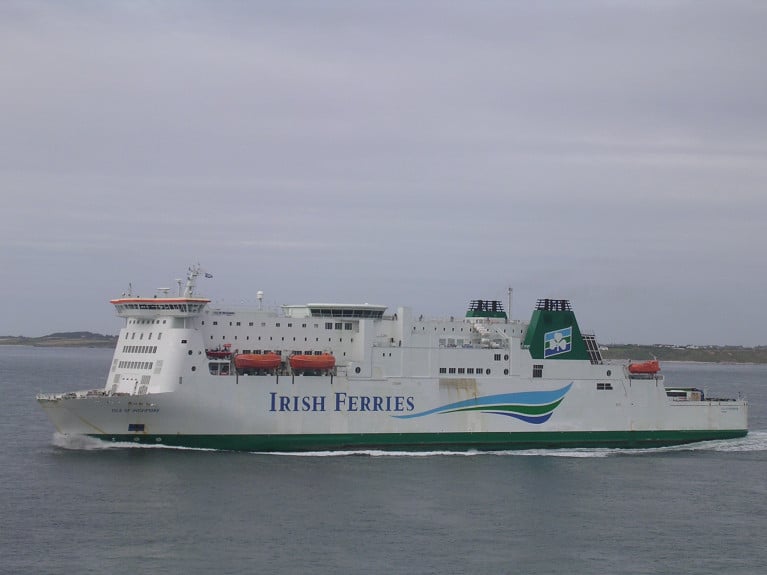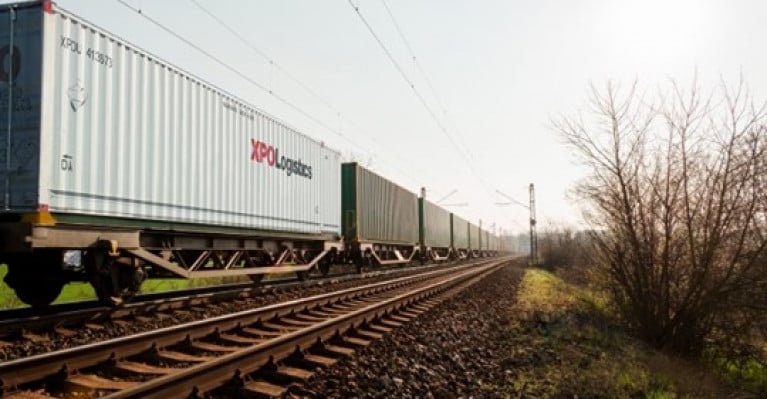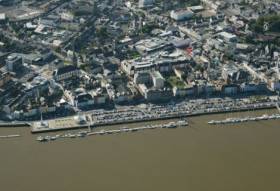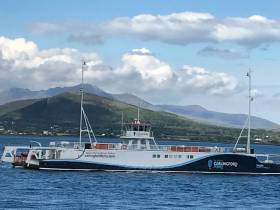Displaying items by tag: New service
The Port of Cork Company has welcomed the first call of the new MSC direct freight service to Europe at Cork Container Terminal (CCT) which took place yesterday (Thursday) evening.
The development follows a highly anticipated announcement in early February as Afloat reported on the direct Cork to Europe service.
MSC Shipping Group, the world’s largest deep-sea line operator, is now running a new route linking Cork directly with northern Europe for the first time, offering enhanced trade connectivity and an economic boost for businesses in Ireland.
The container vessel, MSC Nikoleta remains in the port today at the CCT and where the vessel spans over 180ft in length and has the capacity to carry 1,720 TEU of cargo per week between Cork and the ports of Le Harve, France and Antwerp in Belgium.
The ship carried goods from global industry to businesses in Cork.
Commenting on the new service, Conor Mowlds, Chief Commercial Officer at the Port of Cork Company stated, “This new service is a welcome addition to the Port of Cork and is great news for the business economy in Munster. We are delighted that MSC is now offering a direct call to Cork, offering enhanced connectivity to mainland Europe".
"This new service, plus the recent FDI report ranking Cork as the number one small city in Europe for economic potential, further enhances the Port of Cork’s positioning as a catalyst for global trade and for attracting foreign direct investment. We welcome this as the first of many deep-sea lines to use Cork Container Terminal as a global gateway to connect.”
Simon McKeever, Chief Executive of the Irish Exporters Association, commented: “Ireland, as an island nation on the edge of Europe, has always been dependent on the prosperity of our ports and shipping services. Combined they both make a significant contribution to Ireland’s economy. We welcome the continuous investments being made in the ports sector, particularly in the Port of Cork, where the addition of Cork to the schedule of the world’s largest deep-sea line, MSC, will bring greater economic benefits to the region.”
The new service which commenced yesterday, 2nd March is to run weekly from this date.
A first for Irish Ferries, as the subsidiary of Irish Continental Group plc (ICG) has announced a new service on the Dover – Calais route.
The service is planned to start in June 2021, with the transfer of Isle of Inishmore (see newer ship for Rosslare-Pembroke Dock route) to the UK-France route. Additional capacity will be added in the coming months.
Irish Ferries is the market leader for freight and passengers between Britain and the Republic of Ireland, a leadership position that has been built on the twin pillars of customer focus and investment in purpose built ships for each route. An Irish Ferries spokesman said:
We are very excited about launching our services on the best short sea ferry market in the world and we believe we can bring more choice for customers in the years ahead.
As part of our commitment to the movement of freight on and off the Island of Ireland to both the UK and Europe, this additional capacity on the Dover – Calais route will significantly strengthen the capacity and reliability of the landbridge for exporters and importers.
Hauliers will now have one operator providing an inclusive service on the Dublin - Holyhead, Rosslare - Pembroke and Dover - Calais routes. This will allow exporters and importers easier, cheaper, and quicker access to our European markets via the Common Transit Convention.
It is intended to offer passenger services on the route. The initial level of passenger services offered will be dependent on the easing of Covid-19 travel restrictions.
Doug Bannister, Chief Executive, Port of Dover, said: “We are delighted to welcome Irish Ferries to Dover. This announcement gives the millions of customers across the UK and the Republic of Ireland who value the intrinsic benefits of the shortest sea crossing to Europe, the prospect of even more choice. We believe the inclusive landbridge product will be popular with Irish exporters and will strengthen the just in time supply chain into the European Union. This is a clear signal of market confidence in the Dover route and will complement the resilient services currently provided. We wish Irish Ferries every success and look forward to having them on the route in the summer and working together as part of the Dover team building the future success of the Short Straits.”
Jean-Marc Puissesseau, Chairman, Port of Calais, said: “the commencement of the service operated by Irish Ferries emphasises the strategic position of the port of Calais in the trade between Ireland, the United Kingdom and the continent. It is a clear sign of confidence just a few weeks before the opening of the new port of Calais
Rail-Freight Service Set to Boost Ballina's Busy Business Via (Belview) the Port of Waterford
RailSail: Details of a proposed new service were outlined by XPO Logistics at the latest Irish Exporters Association Western Council roundtable webinar.
As Western People reports, Ballina Beverages – which is a long-standing client of XPO Logistics – will be the main user of the proposed new sustainable service which will help transport the company’s soft drinks concentrate to global markets.
Ballina Beverages prioritises eco-friendly logistics and rail freight is the ideal solution for its transport requirements in that respect.
Through XPO, the freight movement from Ballina to (Belview) the port of Waterford will then be transferred to Rotterdam Port by ferry and further multi-modal transport to world markets.
XPO has been working on the new freight project with Irish Rail since arriving in Ireland.
More on this development here.
#NewService - An established Wexford boat tour operator writes Independent.ie is due to start a new river cruise service by bringing people on the Barrow by 2019.
New Ross Municipal District Director Eamonn Hore told last week's meeting of the body at Tintern Abbey that Kilmore Quay man Declan Bates has been planning the business venture - which will see up to 13 people employed - since 2013.
The vessel will be able to take between 90 and 150 people and would employ nine onboard staff on year one, running from mid-March to mid-October.
Describing the proposal as 'really exciting,' Mr Hore said the River Barrow is under utilised.
'There is a whole story to be told about the River Barrow. We want this to be a large scale, flagship experience linking Waterford and New Ross,' Mr Hore said.
The vessel is expected to cost around €1m and would run from opposite the Granville Hotel in Waterford city centre, to New Ross quay and back daily from March to October.
For more on this new venture, click here.
New Carlingford Service Facing Possible Delay
#Delays - The Scenic Carlingford Ferry, which was set to launch this month has stated that it is "looking like it could be another couple of weeks" before the car-ferry is ready to get underway.
In the Dundalk Gazette, the Chief Executive of the ferry operator Pamela Houston said, “We are still hoping to set sail officially in June but it is looking like it could be another couple of weeks. We are quite simply at the mercy of bespoke navigational aids and once they are delivered and installed, we can get underway.”
“We are, as you would expect, following due process in terms of the official sequence for final approvals before opening the service for passengers. All the Captains are hugely experienced and already carry the official Certificate of Competency to operate a range of vessels, hence they can be seen putting the Ferry through its paces.”
For more on the story click here.

































































